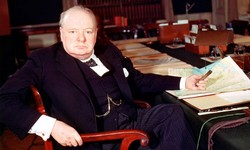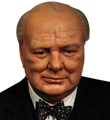Winston Churchill
|
| updated |
Copy Link Code
|
 Winston Churchill was one of the most proficient political leaders of all time. As the Prime Minister of Britain during World War II, his genius at diplomacy, strategy, and political maneuvering was, arguably, his crowning achievement.
Winston Churchill was one of the most proficient political leaders of all time. As the Prime Minister of Britain during World War II, his genius at diplomacy, strategy, and political maneuvering was, arguably, his crowning achievement.
From his earliest years, Churchill was not expected to fulfill his father's expectations. Having been born into an aristocratic family – descended from a long line of heavily-titled Englishmen – Winston's father was sternly disapproving of his oldest son. His mother – the daughter of an American millionaire – was more concerned with her social life than her son's pleas for attention. Devoid of parental affection, Churchill spent most of his time with his stern governess (who failed to teach him anything) and his beloved nanny, Elizabeth Anne Everest (or 'Old Woom'). Finally, at the age of 12, he was sent off to boarding school at Harrow School, in London. Because his father felt he wasn't smart enough for university schooling, Winston was sent to military school at Royal Military College, Sandhurst, graduating in 1894).
The years from 1900 to 1905 were a combination of military and politics. Churchill's military career took him to India, Cuba, Egypt, Afghanistan, and South Africa. In India, he spent his inordinate amount of free time playing polo on a championship team and voraciously reading the classics and anything he could find on Parliament procedure, issues, and debates. He also spent time as a war correspondent, a brief time as a prisoner of war, and learned to love Cuban cigars. His political career began with his first election as Member of Parliament (1900) and progressed rapidly, until it became so demanding of his time that it finally overtook his military career.
From 1905 to his retirement in 1964, Churchill enjoyed one of the most active and varied political careers of any leader, throughout all time. He even held offices more than once, with two terms as First Lord of the Admiralty (from 1911-15 and 1939-40) and two terms as Prime Minister of Britain (from 1940-45 and 1951-55). With one of the most far-reaching political careers, during the most contentious times, Churchill was able to enact swift and sweeping social change, prevent wars, negotiate treaties to end wars, and implement changes that continued to affect the world at large decades after his death.
Throughout his life, Churchill was also a prolific and skilled writer. His writing was published from 1898 through 1987 (even being published posthumously, more than two decades after his death) totaling 43 works in 72 volumes. His writing was so immeasurably outstanding, in fact, that he was awarded the Nobel Prize for Literature in 1953, commending him for his writing and oratory in defense of human rights.
Always a consummate family man, Churchill made sure to schedule time for his lifelong love – his wife, Clementine and their four surviving children. After buying the family home (Chartwell) in 1922, he spent several days laying bricks for new buildings or garden walls, planting bushes and flowers for the gardens, tending to the animals, and playing with his children.
After a series of strokes in the years just prior to his death, Winston Churchill suffered a final, devastating stroke on January 15, 1965. Just before slipping into a coma, he uttered his final words, "I'm bored with it all." Nine days later, he succumbed to his poor health, leaving this world at the respectable age of 90 years old, having unquestionably earned the right to finally rest.
